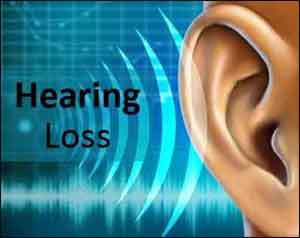- Home
- Editorial
- News
- Practice Guidelines
- Anesthesiology Guidelines
- Cancer Guidelines
- Cardiac Sciences Guidelines
- Critical Care Guidelines
- Dentistry Guidelines
- Dermatology Guidelines
- Diabetes and Endo Guidelines
- Diagnostics Guidelines
- ENT Guidelines
- Featured Practice Guidelines
- Gastroenterology Guidelines
- Geriatrics Guidelines
- Medicine Guidelines
- Nephrology Guidelines
- Neurosciences Guidelines
- Obs and Gynae Guidelines
- Ophthalmology Guidelines
- Orthopaedics Guidelines
- Paediatrics Guidelines
- Psychiatry Guidelines
- Pulmonology Guidelines
- Radiology Guidelines
- Surgery Guidelines
- Urology Guidelines
Smoking associated with increased risk of hearing loss

It is well established that cigarette smoking harms nearly every organ of the body, causes many diseases, and reduces the health of smokers in general and is the leading preventable cause of death.Smoking s associated with coronary heart disease, stroke, COPD and lung cancer. In nutshell, smoking causes diminished overall health, increased absenteeism from work, and increased health care utilization and cost.Dr. Huanhuan Hu of Japan's National Center for Global Health and Medicine and colleagues have conducted a study of over 50,000 participants over 8 years in Nicotine & Tobacco Research and have found that smoking is associated with increased risk of hearing loss. The study has been published by Oxford University Press.
Researchers analyzed data from annual health checkups, which included audio testing performed by a technician and a health-related lifestyle questionnaire completed by each participant. They examined the effects of smoking status (current, former, and never smokers), the number of cigarettes smoked per day, and the duration of smoking cessation on the extent of hearing loss. Even after adjusting for factors including occupational noise exposure, researchers noted a 1.2 to 1.6 increased risk of hearing loss among current smokers compared with never smokers.
While the association between smoking and high-frequency hearing loss was stronger than that of low-frequency hearing loss, the risk of both high- and low-frequency hearing loss increased with cigarette consumption. The increased risk of hearing loss decreased within 5 years after quitting smoking.
"With a large sample size, long follow-up period, and objective assessment of hearing loss, our study provides strong evidence that smoking is an independent risk factor of hearing loss," said the study's lead author Dr. Huanhuan Hu of Japan's National Center for Global Health and Medicine. "These results provide strong evidence to support that smoking is a causal factor for hearing loss and emphasize the need for tobacco control to prevent or delay the development of hearing loss."
cigarette consumptionCOPDcoronary heart diseaseDr Huanhuan Huhearing lossLung CancerNicotine and Tobacco Researchsmokingstroke
Source : Press ReleaseNext Story
NO DATA FOUND

Disclaimer: This site is primarily intended for healthcare professionals. Any content/information on this website does not replace the advice of medical and/or health professionals and should not be construed as medical/diagnostic advice/endorsement or prescription. Use of this site is subject to our terms of use, privacy policy, advertisement policy. © 2020 Minerva Medical Treatment Pvt Ltd